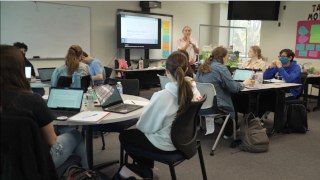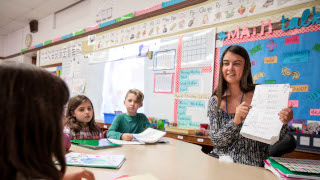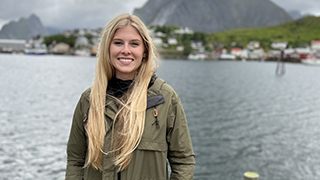Students Prepare to Become Tomorrow’s Inspired Educators
Thursday, September 8, 2022
Many people reminisce about their school experience and remember that one teacher who made a significant difference in their life. Whether it was their favorite subject, a fun memory they had in class, a moment of inspiration with a mentor, or an overall great experience that positively changed the way they look at education. Maybe they didn't enjoy school or weren’t sure what they wanted to do for a career, and that one teacher shined a light on the shadow of uncertainty they had when thinking about their future.
Here at Seton Hall, we do not just teach our students to be any teacher, we help shape future leaders and innovative educators to be responsive to their students' individual needs through observation and adaptation.
There are almost 3.2 million teachers in the United States, according to the National Education Association (NEA)’s 2022 Estimated School Statistics report. And now more than ever, we need to add innovative, dedicated professionals to their ranks. All through the country an estimated 48 million students are waiting to connect with teachers who will inspire them.
That’s where the College of Education and Human Services (CEHS) comes in. "Our curriculum was thoughtfully crafted to teach the content knowledge, teaching skills, competencies, moral and ethical values necessary for outstanding performance in teaching in the classroom and beyond," explains College’s Interim Dean, Joseph Martinelli. "We are committed to making sure our undergraduate programs are based on essential knowledge, evolving technology, current research findings and reflective practices."

"[Our professors] are always there whenever we needed someone to talk to about something we needed help on. And overall, just letting us know that it takes time to be a teacher. You can’t just take one quick step to get there," said Armen Shamim.
Each education student at Seton Hall will have the opportunity to earn multiple teaching certificates in four years, in addition to the College’s 5-year dual degree programs. The real-world experience students get during their academic journey goes well beyond what many other schools in the area offer. Seton Hall students participate in extensive clinical experiences as early as sophomore year, professional development with field experts throughout the year, and exciting internship and job opportunities.
Each program and curriculum emphasize personalization and adaptability through small classes with an 18:1 student-to-faculty ratio. Professors and mentors focus on the needs of each student and provide customized lessons to suit current processes and protocols of teaching. Additionally, CEHS provides students with individualized advisement to ensure their progress exceeds what they need before starting their career.
"Teaching is such a rewarding profession – you're working with children, having fun, watching them grow and making an impact on their lives each and every day," said Mary Mueller, Ed.D. "I believe that to be a truly good teacher you have to appreciate and respect the children that you teach. To me the best teachers are the teachers who know and care about all of their students"
Seton Hall's teachers-in-training are encouraged to serve and lead education organizations on campus to gai additional leadership experience. One example is the local chapter of NJ Student Education Association (NJSEA), an organization committed to professional development, community involvement, and political action. Additionally, the campus' distinguished chapter of Kappa Delta Pi (KDP) International Honor Society in Education has been selected by KDP National Headquarters to receive the 2022 Chapter Programming Award Recipient for Leadership Development. Education majors are all welcome to attend free KDP & NJSEA workshops and events offered throughout the year.
Students and their professors form a close-knit community with opportunities to volunteer on campus and in the local community, participate in leadership organizations, and collaborate in student-faculty research. CEHS has a long-standing partnership with Cranford School District where education majors serve as student teachers. Students may also work as academic program instructors for the Greater Newark Tennis and Education (GNTE) over the summer to head up the education portion of the GNTE’s summer tennis program, where campers are encouraged to have an active body and mind.
"We know that the varied experiences our students have at Seton Hall really ensure that they have the skills and the confidence to succeed in the classroom," explains, Omayra Arocho, Ph.D. Associate Dean, College Engagement and Community Development.
Gaining Experience in the Classroom

"We work diligently to place each student in districts and schools with different
community contexts and demographics," said Karen Grove, Director of OCEAR. "One of
our goals is to ensure when a student is recommended for certification they have a
breadth and depth to their placements that provides them with experience and knowledge
teaching all learners."
During their clinicals, education students may be assigned to a variety of school placements to ensure that they are exposed to different learning environments. Each placement is closely aligned with courses and assignments, where students can apply methods and strategies to their field work. "Some of my favorite conversations are with superintendents and principals who have reviewed our students’ resumes. They are usually pleasantly surprised by how many and how diverse the classroom experiences are,” Grove explained.
"Every week, I come into my classes and my professors ask how my placement was going, which was awesome. And I always knew if I had any questions, I could always go and ask them," said Abby Walker.
The opportunities for teachers to become dynamic and empathic leaders are endless at Seton Hall. The Buccino Leadership Institute is one more example of the opportunities that await education majors at Seton Hall. The Center focuses on developing skills and experiences students need to be Collaborative Leaders in schools and communities. Along with their clinicals, and classroom experiences, leadership students are exposed to real life problems, while developing sound values, a research orientation to practice, effective management skills and the ability to build a sustainable, diverse learning community all centered on the leadership pillar of Collaboration.
College of Education and Human Services' undergraduate programs include:
- B.S.E., Integrated Elementary and Special Education
- B.S.E., Elementary and Special Education, with an M.S. in Speech-Language Pathology (4+1)
- B.S.E., Secondary Education
- B.S.E., Secondary and Special Education
- B.S.E. in Elementary and Special Education/M.A. in Special Education with a concentration in Applied Behavior Analysis (5-year)
To learn more or apply to the College of Education and Human Services, click here.
Categories: Education






